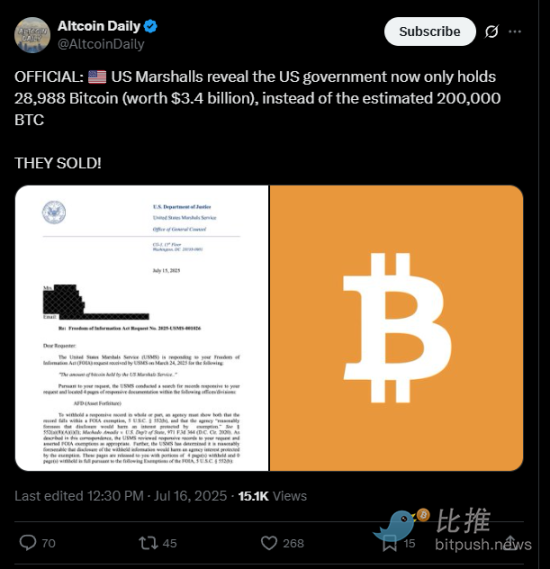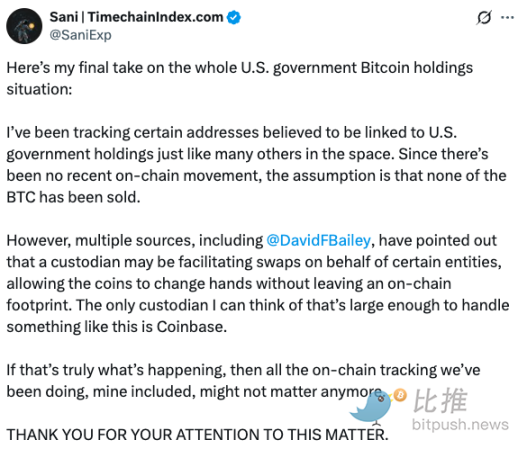Author: BitpushNews
Today, a document obtained by independent journalist L0la L33tz through a Freedom of Information Act (FOIA) request, which was responded to on July 16, has dropped a heavy "bomb" in the crypto community.
The FOIA request was submitted on March 24 of this year, and the document states that the U.S. Marshals Service, a division of the Department of Justice, reported holding 28,988.35643016 bitcoins, valued at approximately $3.44 billion at current market prices.

This figure is nearly 90% less than the previously disclosed 200,000 bitcoins (for example, on-chain analytics firm Arkham Intelligence estimated that the total value of cryptocurrency assets held by the U.S. government is close to $25 billion), immediately sparking speculation in the market about whether the U.S. government has quietly sold off most of its holdings.


L0la L33tz emphasized that the list she received from the U.S. Marshals Service is "a list of all bitcoins held by the U.S. Marshals Service." This means that other seized bitcoins may still be held by the agencies responsible for the seizures, rather than being uniformly stored at the Marshals Service. Therefore, the data from the Marshals Service does not represent the "total stock" of bitcoins held by the U.S. government.
The key to understanding this data lies in distinguishing between "forfeited assets" and "seized assets."
Forfeited assets: These are assets that have undergone legal procedures, and ownership has been legally transferred to the government. The U.S. Marshals Service, as a law enforcement agency of the federal courts, is typically responsible for managing and auctioning these forfeited tokens seized by organizations including the FBI and IRS.
Seized assets: These refer to assets temporarily held by law enforcement agencies during investigations. These assets may not have undergone final legal judgment, and their ownership has not fully transferred to the government, thus they cannot be sold.
This explanation clarifies the market's confusion regarding certain on-chain trackers (such as Arkham, BTC Treasuries, etc.) that list government-related wallet addresses. Some viewpoints suggest that certain public tracking tools often display bitcoins that are "seized" but have not yet been legally forfeited by the government. For example, Arkham tracked 94,000 bitcoins from the Bitfinex hack, but the forfeiture process for these assets has not been finalized. This means that even if these bitcoins are currently under government control, they may be "unsellable" due to incomplete legal procedures.
Are On-Chain Footprints "Ineffective"? Latest Speculations Regarding Custodian Off-Chain Transactions
However, discussions about whether the U.S. government has "sold off" its bitcoins have not completely subsided; rather, they have become more complex due to new clues.
David Bailey, an early bitcoin advocate, CEO of Bitcoin Magazine, and founder of Nakamoto, suggested that in this case, "tracking on-chain footprints is meaningless because it (the transaction) is conducted through custodians."
Crypto analyst Sani (@SaniExp) delved into this topic.

Sani stated that he and many others in the industry have been tracking on-chain addresses believed to be related to U.S. government holdings and have indeed not found any large-scale on-chain transfers recently, which would support the hypothesis of "no sales." However, Sani cited multiple sources indicating that custodians may be facilitating "off-chain swaps" on behalf of certain entities. This operation allows for the transfer of ownership without generating on-chain transaction records. Sani speculated that if such large-scale off-chain transactions exist, the only custodian capable of handling such volume might be Coinbase.
Sani's viewpoint is that in this case, the effectiveness of on-chain tracking becomes "not conclusive," and he did not assert that on-chain tracking is completely ineffective.
In response, David Bailey himself speculated, "Despite the differences in details, the broad conclusion is that the U.S. Marshals Service has been selling (bitcoins) and has left no footprints on-chain." He emphasized that this is a "significant development."
Pressuring Trump for a "Strategic Reserve" Buyback?
In the current context, the disclosure of this number is particularly sensitive. U.S. President Donald Trump had previously stated that the U.S. government would retain its bitcoin holdings as part of a "Strategic Bitcoin Reserve" (SBR).
In March of this year, he signed an executive order requiring federal agencies to transfer their held crypto assets to the Treasury Department, which would be responsible for overseeing the reserve. Trump's crypto "tsar," David Sachs, also proposed a "budget-neutral" strategy aimed at acquiring more bitcoins for government funds. Additionally, the executive order on March 6 established a "U.S. Digital Asset Reserve" to store digital assets seized in criminal or civil litigation, excluding bitcoin.
U.S. Senator Cynthia Lummis, a major supporter of the Strategic Bitcoin Reserve, stated on the X platform: "I am shocked by reports that the U.S. has sold over 80% of its bitcoin reserves—leaving only about 29,000 bitcoins. If this is true, it would be a complete strategic blunder and set the U.S. back years in the bitcoin race."
David Bailey believes that the significant reduction in the U.S. government's bitcoin holdings may explain the long stagnation in prices and views it as a "bullish" signal. His latest tweet also mentioned that when "discovering that the U.S. may need to buy back hundreds of thousands of bitcoins to replenish the SBR," the question of Federal Reserve Chairman Powell's future also surfaced, which he sees as a "clear mandate."
In summary, whether these 28,988 BTC represent the entirety of the U.S. government's holdings or not, they have injected a critical variable into the market—if the previous market corrections/stagnation were indeed caused by the U.S. government's OTC sales, then once the "newbie chips" have completed their transfer to "diamond hands," the foundation for bitcoin's rise may become more solid.
What is even more intriguing is the strategic implications: as the U.S. shifts from a potential major seller to a possible buyer, the liquidity restructuring brought about by this role reversal may have more far-reaching effects than mere data disputes.
免责声明:本文章仅代表作者个人观点,不代表本平台的立场和观点。本文章仅供信息分享,不构成对任何人的任何投资建议。用户与作者之间的任何争议,与本平台无关。如网页中刊载的文章或图片涉及侵权,请提供相关的权利证明和身份证明发送邮件到support@aicoin.com,本平台相关工作人员将会进行核查。




